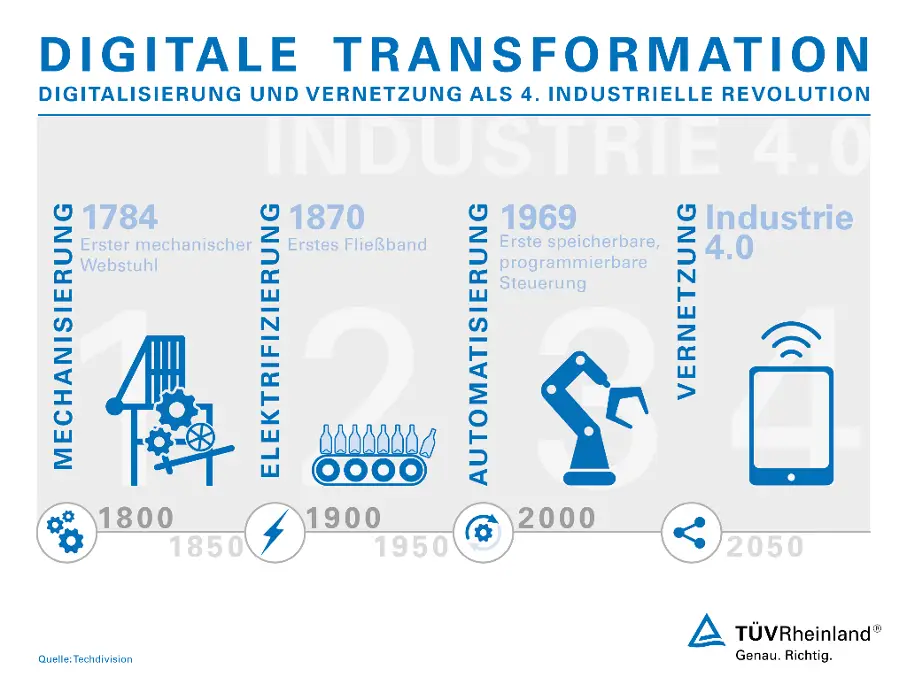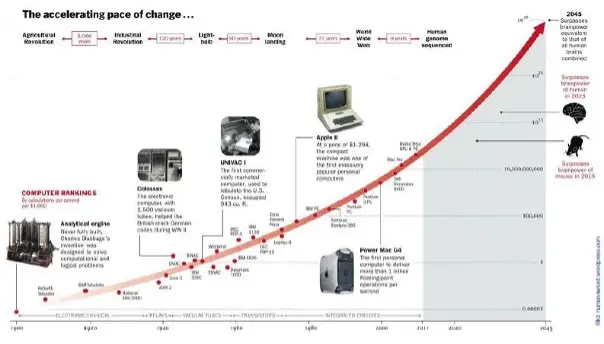Challenges for companies and organizations
The uncontrolled development of AI is currently the subject of intense public debate.
Similar to the chemical, automotive and aviation industries, some are calling for a licensing authority for digitalization in order to curb the negative social and socio-cultural effects – data protection being a prime example.
Organizations and companies should leave this task to lobbying organizations and concentrate on adapting the corporate organization and culture themselves.
In order to gain a better understanding of the necessary adaptation of the company organization, it is worth taking a look at the history of industrial evolution and the digital revolution.
Industrial evolution since 1784 has been characterized by an adaptation of the organization to the production process (organization follows production).
While mankind was able to take almost 100 years to make the transition from the steam engine to the introduction of electricity and adapt the organization to the new requirements accordingly, we have experienced massive changes within the last 30 years (!) in the phase of the digital revolution – especially in the phase of digital networking.
We had to realize that a resilient corporate culture is not enough for this change process.
In these dynamic times, only companies that accept the disruptive challenge and can demonstrate a strong, future-oriented corporate vision and a sustainable social organizational purpose can survive.

The merging of production and organizational adjustments in the digital age
Today, organizational challenges no longer adapt to the production process; instead, production and organizational adjustments are increasingly merging in order to keep pace with digital developments/requirements. Instead, many companies today are first creating the organizational framework conditions in order to then flexibly build up the international production process to complement them.
In the early days of digitalization, the focus was on production and organizations had to adapt to changes in production processes caused by automation. The aim of this focus on automation was to save costs.
In the last 10 years, the production process has taken a back seat due to the global, cost-optimized division of labour and “knowledge management” has come to the fore. The main objective of organizations was now to use networking to convert existing knowledge into products as quickly as possible and bring them to market.
The World Wide Web was the first step, and smartphones ignited the next phase of this “knowledge management focus” with the additional important requirement to store all data in a cloud so that it can be accessed anywhere in the world. The current aim is to use AI to have routine tasks performed by artificial intelligence.
Knowledge management is a key success factor because the human resource with the necessary know-how is present worldwide and cannot be “forced” to work at a specific location.

How has organizational development adapted to this?
In many organizations today, we still talk about resilient organizations that can adapt their business model to the pace of change over the past century.
This approach was perfectly adequate in a local, analog, linear world.
This speed of adaptation is significantly too slow for companies in the global, digital, exponential age.
Successful future-oriented companies are increasingly relying on agile, knowledge-focused organizations that must commit to the fail-forward philosophy.
“The digital revolution is challenging companies to radically rethink their structures. They can only master the future through agile organization and knowledge management.”
What does fail-forward mean?
Implementing a fail-forward strategy means anchoring an error-tolerance philosophy in the organization and thus requiring employees to learn from mistakes.
Fail-forward is based on a clear strategy and a corresponding experience design as a foundation.
The corresponding organizational framework conditions must be aligned with this claim and the framework conditions of a global, digital, exponential world.
Thanks to the clear strategy and the corresponding experience design, customers know which services they receive and employees know which offers they need to develop.
The corresponding organizational framework conditions must be aligned with this requirement and the framework conditions of a global, digital, exponential world.
Thanks to the clear strategy and the corresponding experience design, customers know which services they receive and employees know which offers they need to develop.
With this organizational orientation, organizations can act dynamically on the market (so as not to have to react to the market).
Conclusio
In summary, it can be said that the digital revolution requires not only technological but also far-reaching organizational changes.
Companies that remain agile and adaptive will be able to adapt quickly and survive in the dynamic market environment.
The integration of the fail-forward philosophy and knowledge management is crucial in order to fully exploit the potential of AI and other digital technologies and secure a sustainable future.
Only those who have the courage to admit mistakes and learn from them will be successful in the long term.
Discover how Basinghall Partners connects European industrial companies with innovative start-ups to drive technological innovation and set new standards in consulting.
Visit their website for more information about their mission, investments and extensive network of innovation partners.





